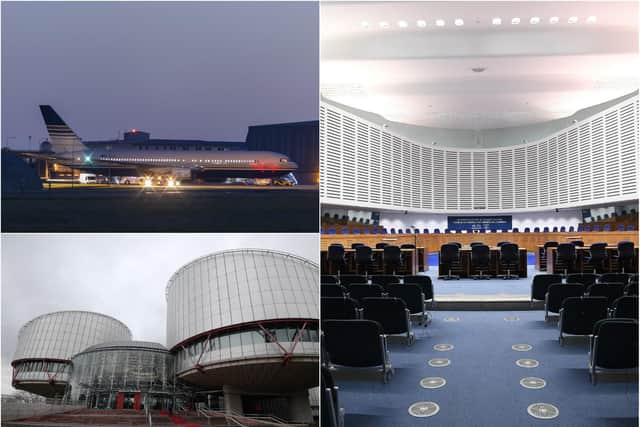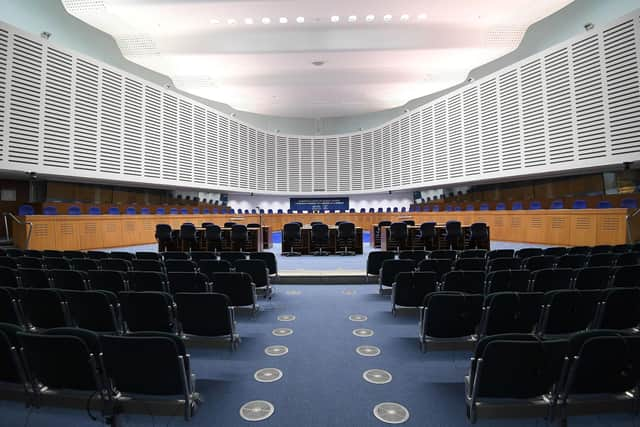ECHR: What is the European Convention on Human Rights? How does it apply to the UK's Rwanda asylum policy?
and live on Freeview channel 276
What is it the European Convention on Human Rights?
The European Convention on Human Rights is an an international convention which protects the human and political rights of people in Europe.
Anyone who feels like their human rights are being violated under the convention can take their case to court.
The history
Advertisement
Hide AdAdvertisement
Hide AdAfter the Second World War and the Holocaust, heads of state in Europe decided to act to stop the terror abuse that had occurred from happening again.
Amnesty International wrote: "It was developed to ensure that governments would never again be allowed to dehumanise and abuse people’s rights with impunity, and to help fulfil the promise of ‘never again’.”
In May 1948, the Congress of Europe was held and attended by, among many others, by Winston Churchill who was a strong supporter and founder of the convention.


"It is for the life and liberty of the individual, for the fundamental rights of man, now menaced and precarious in so many lands, that peoples tremble,” he said.
Advertisement
Hide AdAdvertisement
Hide AdThe Council of Europe was formed and a charter of human rights was agreed, and it was written a year later, with Sir David Maxwell-Fyfe, UK lawyer, MP and prosecutor at the Nuremberg trials, as a leading voice and guided the drafting of the convention.
The European Court of Human Rights (ECtHR) was set up in 1959 to rule on individual or state applications.
Its judgements are binding on the 46 Council of Europe member states that have ratified the Convention.


It is not a European Union institution and Brexit has not affected the UK's relationship with the Strasbourg court or the ECHR.
What is in it?
Advertisement
Hide AdAdvertisement
Hide AdThere are 18 articles in the European Convention on Human Rights:
Obligation to respect human rights. Right to life Prohibition of torture and cruel, inhuman and degrading treatment Prohibition of slavery and forced labour Right to liberty and security Right to a fair trial No punishment without law Right to respect privacy and family life Freedom of thought, conscience and religion Freedom of expression Freedom of assembly and association Right to marry Right to an effective remedy Prohibition of discrimination Derogation in time of emergency Restriction on political activity of non-nationals Prohibition of abuse of rights Limitation on use of restriction of rights


Before 1998, if someone wanted to bring a case under the ECHR they would have to go to the European Court of Human Rights, which was costly, time consuming and complex.
However, after 1998 when the UK enacted the The Human Rights Act and incorporated the articles into domestic law, UK Courts were able to enforce the convention widening human rights protections for citizens.
How does it relate to the UK Government’s new asylum policy?
Advertisement
Hide AdAdvertisement
Hide AdLegal challenges under the convention have grounded flights to Rwanda, with lawyers representing asylum seekers arguing it breaches the ECHR.
Specifically, that there is no structure to bring asylum seekers back from Rwanda should their case succeed, as well as concerns that there won’t be "fair and efficient procedures for the determination of refugee status" in the African nation.
Despite verbal attacks from politicians, it is the duty of lawyers to ensure their clients are fully and properly represented in court, and the duty of judges to ensure the law, including the ECHR, is adhered to fully.
What will happen in Westminster?
Boris Johnson and Home Secretary Priti Patel had been braced for legal challenges, with the Prime Minister in particular hitting out at "lefty human rights lawyers".
Advertisement
Hide AdAdvertisement
Hide AdThe Government has already committed to a shake-up of human rights laws but the intervention of the European court will fuel demands for the UK to leave the convention entirely.
The Prime Minister did not rule out such a drastic measure when questioned about it on Tuesday, ahead of the Strasbourg court's injunction.
But leaving the ECHR - which emerged in the aftermath of the Second World War - would be a significant step which could have major knock-on effects on other international agreements.
Under the Good Friday Agreement, the ECHR underpins human rights guarantees in Northern Ireland.
Advertisement
Hide AdAdvertisement
Hide AdRemaining signed up to the ECHR also helps ensure judicial and legal co-operation with the EU under the terms of the Brexit deal.
Have any countries ever left the ECHR
Only two countries have ever left the Council of Europe and therefore walked away from the ECHR: Greece and Russia.
Greece left the council in 1967 following a military coup as a result of which democracy in the Mediterranean state was abolished.
Russia, which joined as a member in 1996 following the end of the Cold War, was suspended from the Council of Europe earlier this year following the invasion of Ukraine.
President Vladimir Putin then announced Russia’s formal withdrawal from the international body and ministers voted to expel Russia with immediate effect.
Additional reporting by PA.